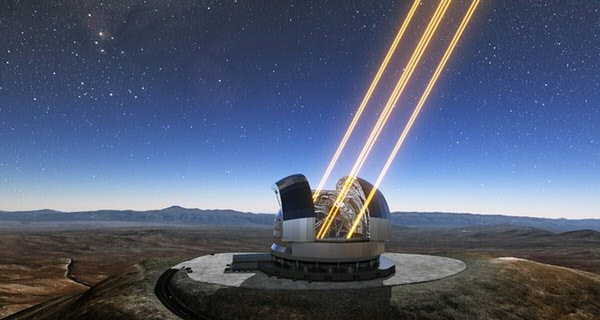Astronomy at Dutch universities leads the world
Astronomy departments at Dutch universities head the world rankings for astronomical institutions. This is the conclusion drawn from a recent evaluation of the Netherlands Research School for Astronomy (NOVA) and the astronomy institutions of the University of Amsterdam, the University of Groningen, Leiden University and Radboud University in Nijmegen.
The evaluation was conducted by an international committee of leading experts on behalf of the Executive Boards of these universities. NOVA and the four institutions were rated as ‘exemplary’, and further assessed as together being among the world’s five leading astronomical institutions.
NOVA is the only programme worldwide that has succeeded in bringing together all national university astronomers within a single coherent research and instrumentation programme, which also encompasses the training of PhD candidates, public outreach and valorisation. The committee indicated that Dutch astronomy leads the world in new and pioneering research areas, such as the evolution of galaxies in the early universe, the first measurement of the length of a day on an exoplanet, and the astrophysical interpretation of the first gravitational waves. This success is due at least in part to NOVA’s close connection with the development and application of new observation instruments for the European Southern Observatory (ESO) and de Atacama Large Millimeter/submillimeter Array (ALMA).
The committee also praised the innovative way in which public outreach on astronomy is conducted and young people’s interest in science subjects is encouraged. Technological spin-offs such as techniques for handling big data, and citizen science projects such as measuring particulates in the Earth’s atmosphere were also commended. NOVA and the participating institutions received an equivalent evaluation in 2010 and 2014. Astronomy in the Netherlands is evidently capable of consolidating this leading role on a world scale over an extended period of time.
The committee also made a number of recommendations, including tightening the management of major instrumentation projects, formulating a longer-term strategy for public outreach and broadening the diversity of staff. If we are to maintain this position as a world leader, stable long-term funding of NOVA is essential. This applies particularly to the development and construction of astronomical instruments that make new discoveries possible but that have a lead time of fifteen years or more.
The NOVA instrumentation programme focuses particularly on instruments for ESO’s Extremely Large Telescope (ELT), which is due to become operational in around 2025 and will then represent the largest ‘eye’ ever directed at the sky. NOVA heads the European consortium building the ELT-METIS instrument, comprising a camera and spectrometer in the mid-infrared range of the spectrum, that is particularly suitable for seeking signs of life in the atmosphere of Earth-like planets. The committee advised that, if the Netherlands wishes to continue to play a leading role in astronomy worldwide, the organisation and funding of NOVA will need to be re-structured so as to align with these kinds of long-term projects.
Leiden University, which acts as programme coordinator on behalf of NOVA, hopes that these proposed financing modifications will be implemented. Carel Stolker, Rector Magnificus and President of the Executive Board of Leiden University, commented, ‘I am proud of our Dutch astronomers who, through this programme of national collaboration, have achieved such a major impact. I hope that the universities and politicians will together make a concerted effort to maintain this leading position for Dutch astronomy. This is a field where so many amazing discoveries are still ahead of us.’

| Last modified: | 26 September 2017 1.12 p.m. |
More news
-
02 April 2024
Flying on wood dust
Every two weeks, UG Makers puts the spotlight on a researcher who has created something tangible, ranging from homemade measuring equipment for academic research to small or larger products that can change our daily lives. That is how UG...
-
18 March 2024
VentureLab North helps researchers to develop succesful startups
It has happened to many researchers. While working, you suddenly ask yourself: would this not be incredibly useful for people outside of my own research discipline? There are many ways to share the results of your research. For example, think of a...
-
04 March 2024
A plant-based sensor
Every two weeks, UG Makers puts the spotlight on a researcher who has created something tangible, ranging from homemade measuring equipment for academic research to small or larger products that can change our daily lives. That is how UG...
